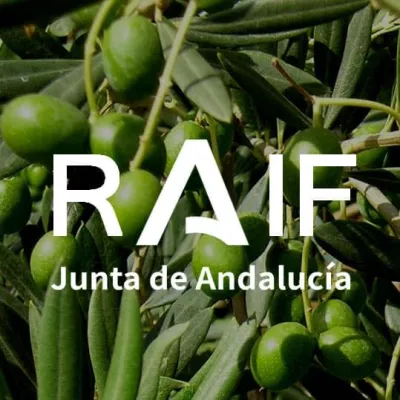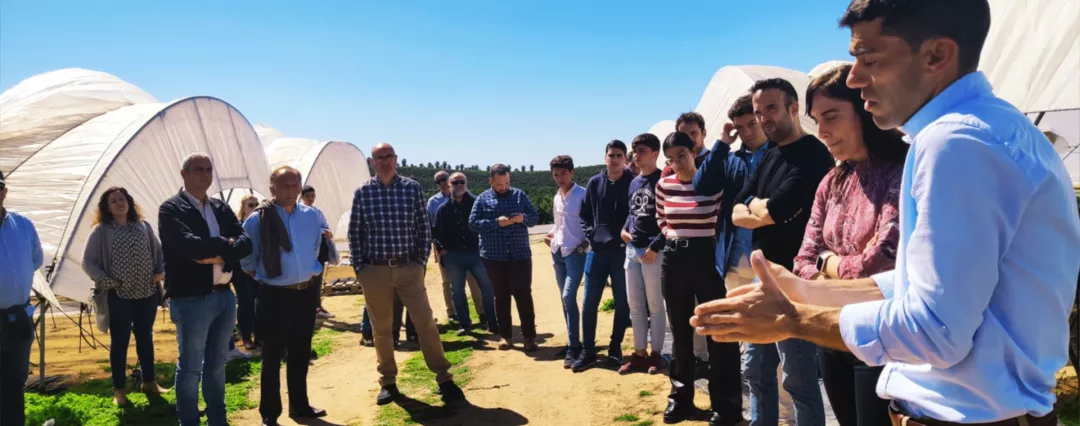General information
RDP Priority
- P2. Competitiveness
RDP Focus Area
- 2A: Farm’s performance, restructuring & modernisation
RDP Measure
- M01: Knowledge transfer & information actions
Beneficiary type
- Public authority / body
Summary
The RAIF project is promoted by the Regional Ministry of Agriculture, Fisheries, Water and Rural Development, and facilitates collaboration between different actors in the Andalusian agricultural sector. By responding to the growing demand for phytosanitary information, the project aims to obtain, gather, analyse, and share data that can support sustainable crop management. Within the collaborative framework of the project, farmers provide monitoring data from their crops, while technicians process the data and share analyses that, because they are fine-tuned to the different biological zones of Andalusia, can really support local farmers in their decision-making.
The project identified different solutions for the control of plant pests and provided training in Integrated Pest Management. Demonstration farms enhanced the process of sharing knowledge about the benefits of optimising and minimising the use of plant protection products. Actions like these directly contribute to the environmental, social and economic sustainability of rural areas.
Results
- Reduced production costs through a more efficient use of pesticides.
- Reduced greenhouse gas emissions through the reduced use of fertilisers and phytosanitary products.
- Reduced time spent on fieldwork thanks to a new digital tool for gathering and submitting data.
- Increased sustainability, with thousands of farmers and technicians making use of the information provided by the project.
- Minimised crop losses through early detection of quarantine pests.
- Improved awareness of good agricultural practices through 150 informative videos.

Promoter
Regional Ministry of Agriculture, Fisheries, Water and Rural Development. Regional Government of Andalusia
Funding
Total budget: 2 185 888 (EUR)
EAFRD: 2 164 029 (EUR)
National/Regional: 21 859 (EUR)
Ressources
Documents
Context
RAIF is a collaborative project that aims to improve the provision of up-to-date information about the phytosanitary status of crops in Andalusia to help minimise the use of phytosanitary products. Since its launch in 2006, the project has involved a total of 500 field technicians, contributing weekly observations about the phytosanitary status of their crops. By providing the best possible service to farmers and technicians, RAIF seeks to inform their decision-making and encourage the sustainable use of pesticides.
RAIF implements the requirements of Directive 2009/128/EC of the European Parliament, and of the Council of 21 October 2009. The project has established a framework for community action, contributing effectively to the sustainable use of pesticides, the provision of tools for pest monitoring and decision-making, and the delivery of advisory services to its members on Integrated Pest Management (IPM). Over the years, RAIF has become a national and international benchmark for providing reliable, quality phytosanitary information.
However, there is a growing demand for information at all levels to comply with EC regulations by using the most advanced pest and disease monitoring systems, and to improve collaboration between the various actors of the agricultural sector. There are also additional special actions that are needed to respond to the specific concerns of the sector.
Objectives
This EAFRD project aimed to further improve the knowledge and skills of farm managers, concerning the phytosanitary status of their crops and the sustainable use of pesticides, through the provision of reliable, free and open information.
It focused on protecting agri-food crops by fostering the early detection of quarantine pests and diseases that could be introduced to the EU as a consequence of globalisation and climate change.
Further sector support was given by updating existing knowledge and by assisting farms with matters of legal compliance in line with EU regulations on the Sustainable Use of Plant Protection Products.
A key objective was to promote and disseminate know-how about IPM among farmers and technicians via a network of demonstration farms.
Overall, the project sought to increase the environmental and economic sustainability of food production in Andalusia.
Activities
Project activities included:
- mapping the territory and establishing representative points with homogeneous agro-environmental characteristics for data collection.
- installing, maintaining and processing data from 79 weather stations strategically distributed across Andalusia.
- drawing up a working protocol with a description of pests affecting Andalusian crops, describing sampling methods, biological control methods, establishing treatment thresholds, etc.
- weekly phenological and phytosanitary monitoring of crops at the then-5 000 data collection points.
- developing computer tools for data collection in the field.
- disseminating results via multiple channels: website, app, GIS crop viewer, newsletter, SMS alerts, digital magazine, social networks, posters, and informative campaigns.
- analysing the data and developing predictive algorithms based on the large database of phenological, phytosanitary and meteorological data to anticipate the future behaviour of pests.
- searching for and selecting farms and places of transit for the monitoring of quarantine pests.
- launching a network of demonstration farms that apply IPM principles to showcase its advantages and thus accelerate its implementation by farmers and advisors.
The key stakeholders of the RAIF project included the regional government of Andalusia, Integrated Production associations, technicians and farmers.
Main results
The main project results include:
- Reduced production costs through the provision of accurate data and information that supports a more efficient use of alternative pest control methods and a decrease in the dependence on pesticides. It is estimated that the use of pesticides could be reduced by 20%.
- Reduced time spent on fieldwork thanks to a new digital tool that supports the submission of collected data. It is estimated that the need for field visits by technicians can be reduced by at least 30%.
- Reduced greenhouse gas emissions through the reduced use of fertilisers and phytosanitary products. It is estimated that a 20% reduction in the use of these products leads to a subsequent reduction in greenhouse gas emissions.
- Increased sustainability, with thousands of farmers and technicians making use of the information provided by the project.
- Minimised crop losses through the early detection of quarantine pests.
- Good level (31%) of female participation.
- Improved awareness of good agricultural practices through 150 informative videos.
- Improved product quality and increased environmental protection through a more precise and efficient use of agricultural resources, thereby enhancing market competitiveness in the EU and elsewhere.
- Improved environmental protection through the promotion of good practice in respectful and sustainable agriculture, such as Integrated Production.
- Increased access to information through a collaborative network between organisations, universities, research teams and farmers, using a reliable database and up-to-date information.
- Improved farm resilience through knowledge and training.
- The project has already been transferred to the region of Extremadura.
Key lessons
- Ensure the involvement of all agents at each stage of the project.
- Focus on establishing robust and enforceable field protocols, with access to digital technology for all.
- Ensure that knowledge and experience from other technicians and professionals are shared to promote learning and foster continuous improvement.
- Retain the focus on collaboration, as it is an effective way of making results available to farmers for informed decision-making.
The RAIF responds to the problems that arise daily in the field.
It allows us to know the evolution of pests and how to act.
